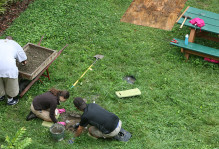Intentions, Consequences, Collaboration
The advance team arrived at Dulles at 3:30 Thursday morning (March 4) — remarkably alert and ready for the trek. Seventeen hours later, we arrived in Ocatal, Nicaragua, after landing in Managua, renting a 4-wheel-drive Toyota, and driving the Pan-American highway to the mountainous northwest. Before leaving Managua, we found the San Francisco clinic and bought and loaded the week’s supply of prescription medicine, which turned out to be slightly more volume than we had anticipated — meaning that everyone but the driver rode with at least one box of meds on her lap. (The cast and their years of project experience: Alex Ferraro, 1st year; Ashley Ingram,2nd year; Gabriela Arias 3rd year, Jacqueline Ramirez, 3rd year; Molly Copeland 2nd year; and me, 4th year).
On Friday, we drove to the Totagalpa clinic, just in time to catch the clinic director on his way to the medical outpost in Las Minas where we will host our week-long clinic. We followed him up the mountain — 30 minutes of dusty, rocky, mountain road, picking up riders as we could along the way. With three years experience to guide us, it took only a short time to work out details for the week. Jackie and Gabi quickly communicated the project’s vision of expanding the health promotion role of the clinic through small-step partnerships with the community. We were off to a strong and positive start. We headed into the communities to visit each of four schools, drop off very small gifts of crayons and to tell the teachers about the planned clinic week.
We have tried for four years to meet with the Executive Director of INPRHU, an NGO whose presence throughout the region is clear and by most evidence very positive. In the first year, we traveled to their headquarters in Somoto, met with a staff member in the field, and made various efforts to arrange meetings to talk or get information about the organization and their efforts — and to introduce ourselves. Over the years since, we’ve met with a senior officer, emailed, phoned, and done research on-line in efforts to understand the organization and its work and to think about our own efforts relative to the considerable presence of this large effort. At 3pm finally we would meet the chief officer. She brought along a staff medical and family health officer. We began by introducing ourselves and the director asked us to describe our mission and our methods.
We were careful to explain our humility with respect to knowledge of Nicaraguan and local culture, our own limited resources and capabilities, our determination to encourage capacity rather than dependence, and our recognition of the dangers of good intentions. The “interview” stretched to four hours and our hostess pressed upon us the seriousness of the INPRHU mission and their sustained efforts in the general region. She worried out loud about people from international organizations coming into communities and taking time from hardworking and busy people who then might not have time to work with those organizations that have been and will be here on a more continuous basis. She questioned the value of bringing additional medicine to communities that won’t be able to count on regular supplies of such medicine – communities who perhaps should be increasing their capacity to grow medicinal herbs and plants to treat illnesses instead of becoming dependent on unreliable sources of help.
These are not unfamiliar concerns. Indeed, we agree. We listen with admiration as the director describes the INPRHU programs, mission, and vision. We can imagine working with them, as we have from our first trip to the area, and we can imagine sharing information with them. She seems far less interested in either. Almost certainly, justifiably so. This is her country; her backyard; her 20-year mission; her large-scale NGO; and her career. Still, the needs of the people and communities of Cuje are patent and compelling; INPRHU has made only very minor inroads into that area and, being dependent on funding in this time of international economic difficulty, may not be at the peak of its capabilities. The Totagalpa clinic director and mayor have been very welcoming and supportive of our efforts and haven’t once urged us to second our efforts to INPRHU or others. In fact, the clinic director asked if we could help him find ways to promote a health education program for hand washing. A small matter; fundamental in many ways, and within the scope of our small-steps strategy.
It’s unclear how we will proceed in our unfolding relationship with INPRHU, but there is no question that it is instructive. We are eager to share the challenge and the questions with our colleagues. They arrive within hours.



No comments.
Comments are currently closed. Comments are closed on all posts older than one year, and for those in our archive.